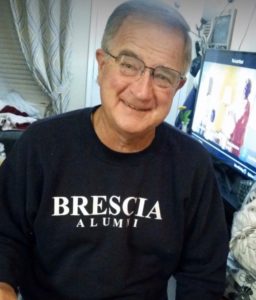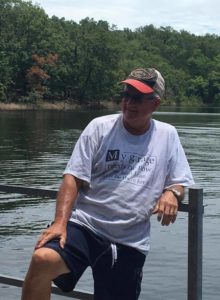Michael Roberts was on a ventilator for 10 days and paralyzed for seven, teetering on a fine line that literally defined the difference between life or death.
The novel coronavirus had a full, icy grasp over Michael’s body. His lungs were weak, and he only had 20 percent oxygen in his blood. Even on a ventilator, things looked bleak as he fought to stay alive.
But the 71-year-old Owensboro resident persevered. And after three weeks of no personal contact with anyone other than the staff at Owensboro Health Regional Hospital, Michael was finally released a few days ago for an emotional reunion with his family.
———-
The worst stretch came at the end of March, when Michael would be turned over onto his stomach for as many as 16 hours at a time to release fluid from his lungs and generate oxygen in his blood — a process that went on for a full week while he was fully under sedation.
When his family asked what the side effects were, doctors said those were kind of irrelevant because it’s either do this, or he dies.
“They said if at any point in time it started to go in a negative direction, it wouldn’t stop and that was just it,” said Michael’s daughter, Cassandra.
Every time Michael was rolled onto his back, oxygen still had to be pumped into his blood. Gradually, he required less oxygen each time.
Doctors began to wean him off the medication that had him paralyzed, and very slowly they began taking him out of sedation.
“At one point they did bring him out just enough to see how he would breathe on his own, and he was breathing over the ventilator, which was amazing news,” Cassandra said.
Michael said he was elated to come out after 10 total days of sedation.
“I felt that I had returned to the living, and there was probably hope at the end of a long tunnel,” he said. “Here’s the problem, all this time you are alone. I hadn’t talked to my family and I didn’t know what anyone knew. I just didn’t know anything.”
———-
 Michael’s first symptoms came on March 18. A couple other family members had also been sick, but he continued to get worse. His fever would spike and he developed a cough in his chest.
Michael’s first symptoms came on March 18. A couple other family members had also been sick, but he continued to get worse. His fever would spike and he developed a cough in his chest.
During a regular appointment for blood work on Tuesday, March 24, Michael told his doctor that he was feeling really bad. An X-ray came back negative for pneumonia, but he was put on some antibiotics just in case.
Michael didn’t get better, and his fever got up to around 102.5 that Thursday evening. The next morning, he called the doctor back.
“He didn’t get 10 seconds into that conversation and they said ‘I don’t know what you’re doing right now but hang up this phone and immediately get to the ER at Owensboro Health,’” Cassandra said.
He checked in later that day, March 27, and he didn’t see his family again in person for the next three weeks.
“Apparently from the time I was told to drop everything I was doing to get to the hospital to when I actually got there, I lost awareness of what was going on,” Michael said. “So I don’t remember much. I honestly had no idea I was under for 10 days.”
———-
Michael was tested for COVID-19 upon entering the hospital, but results were expected to take up to 72 hours to return. The next day his fever got up to 103.
“It was really touch-and-go at that time,” Cassandra said. “It was really scary. The doctors were having a hard time getting his temperature down.”
Michael’s condition continued to worsen into the following Monday.
“It was so difficult for him to breathe,” Cassandra said. “He was on a respirator to try and help him with oxygen but it just wasn’t doing enough. His lungs had just deteriorated so bad.”
Michael was being treated on the fourth floor of the COVID-19 unit at OHRH. He was secluded, and the staff had to take extra precautions to cover up and wear masks.
“Nobody was going in to see him that was not medically needed to be there,” Cassandra said.
The doctors talked to Michael’s wife, Debbie, and said they needed to put him on a ventilator, which meant he had to be sedated.
“Because his lungs were fighting so hard, they were just not able to recover on their own. He needed help,” Cassandra said.
———-

By Thursday, April 2, the situation had gotten even worse. Doctors told Cassandra and Debbie that the best option to keep Michael alive was called proning — the process of turning him onto his stomach for extended periods of time.
He would spend as many as 16 hours on his stomach, then about six hours on his back.
“You always want to know what side effects might happen,” Cassandra said. “How long can you do this? How long does this procedure go on until you don’t do it anymore or there’s really severe underlying side effects.”
That’s when doctors said the side effects aren’t really a factor.
Michael’s condition didn’t improve for several days, but it didn’t deteriorate either — good news in and of itself.
———
On April 3, Debbie and Cassandra got a call from Michael for the first time since he had been admitted.
“We sat here and we got to hear him talk,” Cassandra said. “That first conversation with him was extremely emotional. It was wonderful, but it was difficult at the same time.”
Michael had to stay in the hospital without visitors as he went through therapy — learning to walk, talk and eat again — still without the comfort of his family by his side.
“It was excruciating not knowing when I might be well enough to talk to my family directly,” he said.
Cassandra organized a “get-well parking lot gathering” of family and friends, and nurses took Michael to the windows of the hospital so he could see his support group from afar.
“His family, people he loves and cares about, mean so much to him,” Cassandra said. “At that point in time, he hadn’t seen anybody in two weeks. I felt like if he was able to see, even from a distance, the people he knows are backing him up, that it would lift his spirits and hopefully motivate him to do everything he could to get out of there.”
Michael said it’s easy to take for granted how much people are willing to invest in someone.
“Events like that give people the opportunity to outwardly demonstrate the place you hold in their lives,” he said. “I mean, I had 30 people show up in the middle of the afternoon to give me inspiration and a sense of purpose to move forward. It was overwhelming.”
Michael was determined to go above and beyond what was expected from him during therapy sessions, eager to return home.
“My mom, Debbie, that’s his love and his lifeline, and he just needed to see her,” Cassandra said. “My dad being the strong, determined, amazing person that he is, he was going to do whatever it took.”
———-
 Finally Michael was released on April 16, nearly a month after his first symptoms.
Finally Michael was released on April 16, nearly a month after his first symptoms.
“There were a multitude of emotions,” he said. “First was elation at the idea of maybe seeing my family and being reunited with them. Second was an overriding fear that to be released back to my family would endanger them if this virus was still present inside me in any way. Third, surprisingly, there was a question in my mind of whether I was emotionally strong enough to handle the return. And fourth is now the process of rehab and can I handle it.”
The hospital staff made sure to let him know how happy they were that Michael was a survivor, forming lines down the halls all the way to the exit.
“It was amazing because all of a sudden all the nurses and all the staff were lined along the hallway,” Cassandra said. “Everybody was clapping and cheering. It was just really emotional. I just know he was really grateful for everything the staff did and we were just beyond grateful for all the healthcare workers and everything they did to take care of my dad to get him home to us sooner than later.”
Michael has been recovering at home, where he lives with Debbie and Cassandra. His two sons Jeff and Jason reside in Texas — where Michael and Debbie retired from four years ago — and both are eager to visit when it is safe to do so.
He is still susceptible to even a common cold, so for now Michael and his family are taking every precaution they can to keep him safe and comfortable.
“It’s hard to determine what normalcy will eventually look like,” he said. “In-house self-administered rehab has begun, and it’s difficult to determine the broad range of therapies that are going to be required, the effort to execute them and if I’ll have the strength for it all. I believe that my basic belief in the Lord gave me the strength that helped carry me through.”
“We’re just grateful beyond belief for the fact that he’s still here,” Cassandra said. “It’s definitely been a journey.”



